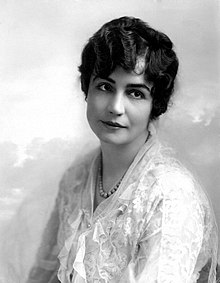Lois Weber
| Lois Weber | |
|---|---|

Weber in 1916
|
|
| Born |
Florence Lois Weber June 13, 1879 Allegheny City, Pennsylvania, U.S. |
| Died | November 13, 1939 (aged 60) Hollywood, California, U.S. |
| Occupation | Actress, film director, film producer, screenwriter |
| Spouse(s) |
Phillips Smalley (1904–1922; divorced) Harry Gantz (1926–1935; divorced) |
| Awards |
Hollywood Walk of Fame – Motion Picture 6518 Hollywood Blvd |
 |
|
|
|
Lois Weber (June 13, 1879 – November 13, 1939) was an American silent film actress, screenwriter, producer, and director, who is considered "the most important female director the American film industry has known", and "one of the most important and prolific film directors in the era of silent films". Film historian Anthony Slide asserts that: "Along with D.W. Griffith, Weber was the American cinema's first genuine auteur, a filmmaker involved in all aspects of production and one who utilized the motion picture to put across her own ideas and philosophies."
Weber produced an oeuvre comparable to Griffith in both quantity and quality, and brought to the screen her concerns for humanity and social justice in an estimated 200 to 400 films, of which as few as twenty have been preserved, and has been credited by IMDb with directing 135 films, writing 114, and acting in 100. Weber was "one of the first directors to come to the attention of the censors in Hollywood's early years".
Weber has been credited as pioneering the use of the split screen technique to show simultaneous action in her 1913 film Suspense. In collaboration with her first husband, Phillips Smalley, in 1913 Weber was "one of the first directors to experiment with sound", making the first sound films in the United States, and was also the first American woman to direct a full-length feature film when she and Smalley directed The Merchant of Venice in 1914, and in 1917 the first woman director to own her own film studio.
During the war years, Weber "achieved tremendous success by combining a canny commercial sense with a rare vision of cinema as a moral tool". At her zenith, "few men, before or since, have retained such absolute control over the films they have directed – and certainly no women directors have achieved the all-embracing, powerful status once held by Lois Weber." By 1920, Weber was considered the "premier woman director of the screen and author and producer of the biggest money making features in the history of the film business".
Among Weber's notable films are: the controversial Hypocrites, which featured the first full-frontal female nude scene in 1915; the 1916 film Where Are My Children?, which discussed abortion and birth control, and was added to the National Film Registry in 1993; her adaptation of Edgar Rice Burrough's Tarzan of the Apes novel for the first ever, Tarzan of the Apes film in 1918; and what is often considered her masterpiece, The Blot in 1921.
...
Wikipedia
